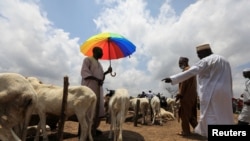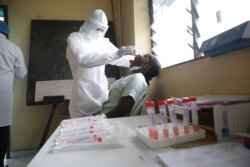More than one million livestock being transported from Cameroon and Chad for Eid al-Adha, the Muslim feast of sacrifice, have been blocked at the borders with Equatorial Guinea, Gabon, and Nigeria. Cameroon’s neighboring states are refusing imports due to COVID-19, forcing livestock merchants who depend on the annual festival, known locally as Tabaski, to sell at cut-rate prices.
Spokesperson for the Central African Association of Cattle Sellers Clementina Ondo said their trade was already crumbling because of COVID-19.
The situation is made worse, she said, because border authorities are blocking trade of their livestock raised to sell for the Muslim feast of Eid al-Adha, known locally as Tabaski.
Ondo spoke via a messaging app from the Cameroon town of Kiossi, on the borders with Equatorial Guinea and Gabon.
She said at least 500 sheep and cattle sellers now find themselves in serious economic hardship. Ondo said it is unfair for major consumers of their animals like Gabon and Equatorial Guinea to completely seal their borders during peak sales periods like the feast of Tabaski. She said Cameroon refused entry to 20 trucks sent from Equatorial Guinea and Gabon to transport sheep in less than 24 hours.
Ondo said the sheep and cattle were from northern Cameroon and Chad, where ranching is a main economic activity.
Cameroon’s Prime Minister Joseph Dion Ngute on Wednesday denied his country is blocking the livestock trade.
"We require a certificate to show that people coming in are free of the virus. So, the frontiers are not closed. They are still open but to certain categories of transporters," he said.
In March, Cameroon and its neighbors the Central African Republic, Chad, Equatorial Guinea, Gabon and Nigeria sealed their borders to stop the spread of COVID-19.
Cameroon and Chad later said they would allow merchants access as they were suffering economic hardship from the pandemic. Livestock traders had hoped neighboring states would follow suit or were unaware of the restrictions.
But the Association of Cattle Sellers this week reported that Equatorial Guinea and Gabon refused imports of over 200,000 sheep and cattle.
The association said Nigerian border authorities blocked another half-million animals from being exported from Cameroon.
But while Cameroon’s livestock suppliers are suffering the glut, local buyers are benefitting.
28-year-old Cameroonian butcher Kaigama Abo said prices have dropped by up to 70 percent.
He said he can now afford to buy many sheep for the Tabaski feast with Muslim neighbors and friends -- and also to store for selling when the price goes up.
Abo said he is buying as many sheep as possible to sell and make much profit when COVID-19 reduces and the borders are opened. He said sheep he buys today at between $60 and $100 are normally sold for $400 to $500. Abo said he cannot miss the opportunity.
But while Cameroon’s Muslims are celebrating the low prices, the Tabaski feast will still be hampered by pandemic restrictions.
People are required to gather in groups of 50 or less, wear face masks, frequently wash their hands, and keep a distance of at least two meters from each other.





